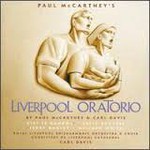
MARBECKS COLLECTABLE: Paul McCartney's Liverpool Oratorio
 $30.00
Out of Stock
$30.00
Out of Stockadd to cart
PAUL McCARTNEY / CARL DAVIS
MARBECKS COLLECTABLE: Paul McCartney's Liverpool Oratorio
Kiri Te Kanawa, Sally Burgess, Jerry Hadley, Willard White / Royal Liverpool Philharmonic, Carl Davis
[ EMI / 2 CD ]
Release Date: Saturday 2 February 1991
This item is currently unavailable via the quick and easy sources, but we’ll make enquiries for you. Please note - listed price is indicative only.
Paul McCartney's Liverpool Oratorio conducted by Carl Davis.
Listening to the United States premiere of Paul McCartney's "Liverpool Oratorio" in Carnegie Hall on Monday night brought back memories of a time a bit over 20 years ago when the hottest rumor in the politically charged youth culture was that "Paul is dead" and his place taken by an impostor. Hidden in recordings, went this conspiratorial notion, were cryptic signs of Paul's demise. On the cover of "Abbey Road," Paul marches barefoot with a cigarette (a "coffin nail"); the jacket to "Sergeant Pepper's Lonely Hearts Club Band" shows a flower-covered grave; above Paul's head a hand is outstretched (a sign, it was said, of death). Moreover, one Beatles song, "Revolution No. 9," if played backward on a turntable, made reference to a "dead man."
Mr. McCartney, of course, was very much alive and has, in fact, been the most successful survivor of the Beatles' disintegration. But that esoteric search through the Beatles' songs and artwork showed how earnest the public was about this group, how much complexity was felt to lie latent in its music, how profound and how "high" it all was.
Some of this feeling seemed still present when Mr. McCartney took his seat in a first-tier box of that high-art temple Carnegie Hall on Monday night. The audience erupted in excitement, and fans on the second and third tiers leaned perilously over the railing. The audience's ovation when the performance concluded seemed partly in celebration, partly in relief that the seriousness always claimed for Mr. McCartney had at last been confirmed on seriousness's home turf.
Of all the Beatles, Mr. McCartney had been most drawn to such ambitions. The classical musical tradition has intrigued him, even influencing, for example, the accompaniments to "Yesterday" and "Eleanor Rigby." Knowing this, the Royal Liverpool Philharmonic Society commissioned this oratorio from a native son in honor of the city's 150th anniversary. Mr. McCartney collaborated with Carl Davis in composing the work, which was unveiled last summer in Liverpool. A recording has been issued with Mr. Davis conducting the commissioning orchestra, and Monday night, a polished American premiere was given by the same players and conductor, with four of the same soloists -- Salley Burgess, mezzo; Jerry Hadley, tenor; Willard White, bass; Jeremy Budd, treble -- and with Barbara Bonney taking the soprano part that Kiri Te Kanawa originally sang. The British choruses were replaced by the Collegiate Chorale and the Boys Choir of Harlem.
But the performance, far from proving the ease with which pop sophistication can segue into classical esthetic realms, demonstrated just the opposite. Mr. McCartney has described his approach to music as "primitive," so Mr. Davis, who is an accomplished writer of film scores, provided the "classical" experience. That is exactly how the oratorio sounded: like a musically primitive assemblage of material, gussied up through some clever scoring. There are echoes of English oratorio and church traditions and the occasional inclusion of a dissonance to signal pain or distress. But the dominant style is of a euphonically tonal pop ballad: the musical texture is very thin, the counterpoint elementary and many settings awkward. The music, often sweet and simple, is incapable of handling contradictory tensions or of expressing intricacy of character.
The story of the oratorio labors under weighty ambitions. It is semi-autobiographical, the story of a boy born in Liverpool in 1942 as the bombs are falling. School days are recalled, with a recurrent anthem-like school motto juxtaposed against another recurring leitmotif that represents the hero's love. There is a scene of teen-age confusion and solitude, a wedding with the woman who inspires the love leitmotif, some evocations of daily life ("Working women on the go,/Will they ever know/What it takes to run the show?"), and a marital crisis in which the pregnant wife runs into the street and is hit by a car. By the end, all is resolved, and even religion is invoked ("God is good without an O" is one expression of new-found faith).
There are moments of beauty and pleasure in this dramatic miscellany -- the nurse's devotional song, for example -- but while composers like Menotti and Bernstein have treated equally banal dramas with musical acuteness, here the only resource is Mr. McCartney's melodic charm and earnestness.
The music's innocent sincerity makes it difficult to be put off by its ambitions. But the oratorio suggests that the kind of musical and emotional simplicity that make a pop hit can seem barren in the concert hall.
The tale is told of George Gershwin approaching Arnold Schoenberg for composition lessons. "Why do you want to be an Arnold Schoenberg?" the Serialist supposedly responded. "You're such a good Gershwin already." As soon as I got home and played "Sergeant Pepper" in glad relief, I imagined Benjamin Britten saying something similar to the composer of "Liverpool Oratorio."
New York Times (1991).
Tracks:
1-1 Movement I: War 9:41
1-2 Movement II: School 12:14
1-3 Movement III: Crypt 10:04
1-4 Movement IV: Father 11:16
2-1 Movement V: Wedding 8:37
2-2 Movement VI: Work 15:02
2-3 Movement VII: Crises 21:08
2-4 Movement VIII: Peace 9:26